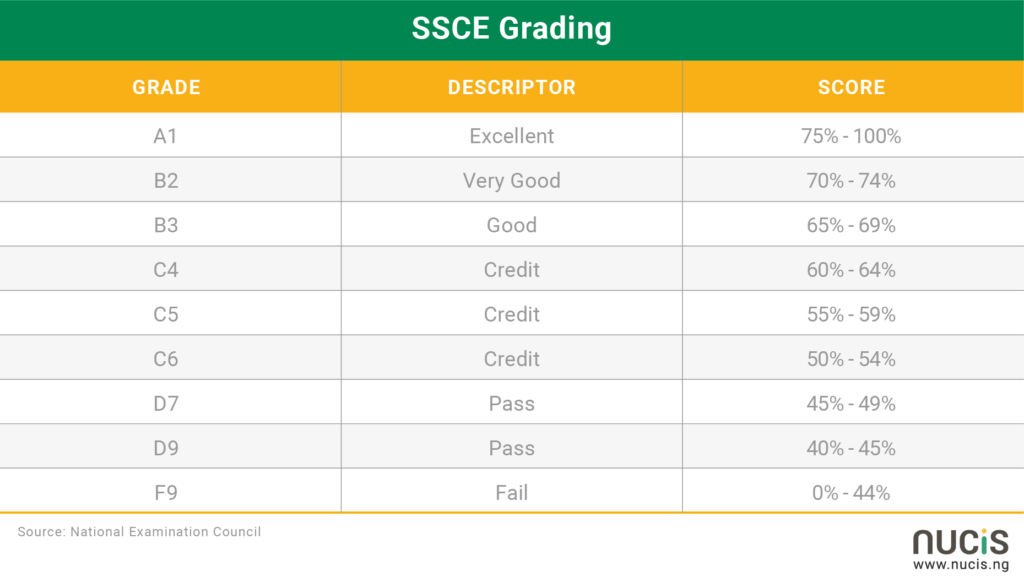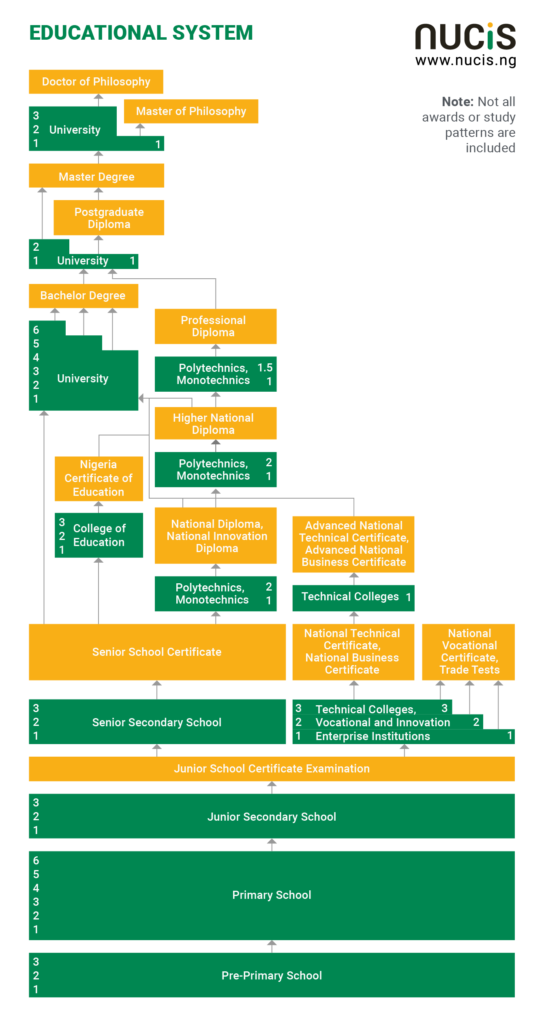IN BRIEF: The EDUCATION SYSTEM
Administration
Nigeria has a federal system of government with 36 states and the Federal Capital Territory (FCT) of Abuja. Within the states, there are 744 local governments in total.
Education is administered by the federal, state and local governments. The Federal Ministry of Education is responsible for overall policy formation and ensuring quality control, but is primarily involved with tertiary education. School education is largely the responsibility of state (secondary) and local (elementary) governments.
The country is multilingual, and home to more than 250 different ethnic groups. The languages of the three largest groups, the Yoruba, the Ibo, and the Hausa, are the language of instruction in the earliest years of basic instruction; they are replaced by English in Grade 4.
Overall Structure
Nigeria’s education system encompasses three different sectors: basic education (nine years), post-basic/senior secondary education (three years), and tertiary education (four to six years, depending on the program of study).
According to Nigeria’s latest National Policy on Education (2004), basic education covers nine years of formal (compulsory) schooling consisting of six years of elementary and three years of junior secondary education. Post-basic education includes three years of senior secondary education.
At the tertiary level, the system consists of a university sector and a non-university sector. The latter is composed of polytechnics, monotechnics, and colleges of education. The tertiary sector as a whole offers opportunities for undergraduate, graduate, and vocational and technical education.
The academic year typically runs from September to July. Most universities use a semester system of 18 – 20 weeks. Others run from January to December, divided into 3 terms of 10 -12 weeks.
Basic Education
Elementary education covers grades one through six, the curriculum includes: English, Mathematics, Nigerian language, basic science and technology, religion and national values, and cultural and creative arts, Arabic language (optional). Pre-vocational studies (home economics, agriculture, and entrepreneurship) and French language are introduced in grade 4.
English is commonly the language of instruction for the last three years of elementary school. Students are awarded the Primary School Leaving Certificate on completion of Grade 6, based on continuous assessment.
Progression to junior secondary education is automatic and compulsory. It lasts three years and covers grades seven through nine, completing the basic stage of education. The curriculum includes the same subjects as the elementary stage, but adds the subject of business studies.
At the end of grade 9, pupils are awarded the Basic Education Certificate (BEC), also known as Junior School Certificate, based on their performance in final examinations administered by Nigeria’s state governments. The BEC examinations take place nationwide in June each year and usually last for a week. Students are expected to take a minimum of ten subjects and a maximum of thirteen. Students must achieve passes in six subjects, including English and mathematics, to pass the Basic Education Certificate Examination.
Senior Secondary Education
Senior Secondary Education lasts three years and covers grades 10 through 12. Students are currently required to study four compulsory “cross-cutting” core subjects, and to choose additional electives in four available areas of concentration. Compulsory subjects are: English language, mathematics, civic education, and one trade/entrepreneurship subject. The available concentration subjects are: Humanities, science and mathematics, technology, and business studies. The new curriculum has a stronger focus on vocational training than previous curricula, and is intended to increase employability of high school graduates in light of high youth unemployment in Nigeria.
Senior School Certificate Examination
At the end of the 12th grade in May/June, students sit for the Senior School Certificate Examination (SSCE). They are examined in a minimum of seven and a maximum of nine subjects, including mathematics and English, which are mandatory. Successful candidates are awarded the Senior Secondary Certificate (SSC), which lists all subjects successfully taken. Students can sit for a second SSC annual exam if interested or if they need to improve on poor results in the May/June exams.
SSC examinations are offered by two different examination boards: the West African Examination Council and the National Examination Council (NECO). The examination is open to students currently enrolled in the final year of secondary school, as well external private candidates (in the November/December session only). The SSCE grading scale is as follows for both WAEC and NECO administered examinations:

Admission to public universities in Nigeria is competitive and based on scores obtained in the Unified Tertiary Matriculation Examination as well as the SSC results. (The Unified Tertiary Matriculation Examination is discussed in greater detail below.) Most universities require passes in at least five SSC subjects and take into consideration the average score. Students must score an average grade of at least ‘credit’ level (C6) or better to be considered for admission to public universities; some institutions may require higher grades.
It is possible to access student results through the West African Examinations Council (WAEC)/or National Examination Council (NECO) websites. The student must provide the PIN number that they purchase, with the PIN number it is possible to retrieve a printable copy of the WAEC results. This is the fastest and most reliable way of verifying a student’s results from Nigeria.
Vocational and Technical Education
The Nigerian education system offers a variety of options for vocational and technical education at both the secondary and post-secondary levels. To combat chronic youth unemployment, the Federal Ministry of Education presently supports a number of reform projects to advance vocational training, including the “vocationalization” of secondary education and the development of a National Vocational Qualifications Framework by the National Board for Technical Education, similar to the qualifications frameworks found in other British Commonwealth countries.
A two-tier system of nationally certified programs is offered at science technical schools, leading to the award of National Technical/Commercial Certificates (NTC/NCC) and Advanced National Technical/Business Certificates. The lower-level program lasts three years after Junior Secondary School and is considered by the Joint Admission and Matriculation Board as equivalent to the SSC.
The advanced program requires two years of pre-entry industrial work experience and one year of full-time study in addition to the NTT/NCC. All certificates are awarded by the National Business and Technical Examinations Board (NABTEB).
Another type of – relatively new – vocational training institution are the so-called “Vocational Enterprise Institutions” (VEIs) and “Innovation Enterprise Institutions” (IEIs), established to provide employment-geared education in the private sector. At the secondary level, VEIs offer programs for graduates of junior secondary school leading to a National Vocational Certificate (NVC). Programs are between one and three years in length and conclude with the award of the NVC Part 1, Part 2 and Final.
At the post-secondary level, IEIs offer diploma programs for holders of the SSC. Programs are two years in length (3-4 years part-time) and lead to the so-called National Innovation Diploma. As of 2017, there were 137 approved IIEs and 72 approved VEIs listed on the website of the National Board for Technical Education.
University Admissions
Until the 1970s, Nigerian universities set their own admissions standards. Due to the growing number of universities in Nigeria’s sprawling higher education system, this practice became problematic, and, in 1978, the Nigerian government established the Joint Admissions and Matriculation Board (JAMB) to oversee a centralized admissions test called the Unified Tertiary Matriculation Examinations (UTME). In November of 2016, the JAMB announced that it did no longer have adequate funds to effectively conduct the nation-wide UTME. Despite these financial difficulties, all public universities are presently mandated to use the governmental admissions test in their admissions decisions, even though some universities have additional requirements going beyond the UTME.
The Unified Tertiary Matriculation Examination (UTME) is a computerized standard test. The multiple-choice test is three hours in duration and conducted once a year, typically in March. It can be taken at test centers in each state of the Nigerian federation, as well as some overseas testing facilities.
The UTME is open to students who achieve credit level or better in English and four other subjects in the SSC exams at the end of the senior secondary cycle. Students with equivalent qualifications like the National Technical Certificate may also be admitted.
Students who sit for the UTME must take exams in English and three subjects related to their intended major in order to be considered for admission into universities. A total of 23 different UTME subject combinations are offered in the fields of: Banking and finance, law, English and literary studies, mass communication, linguistics, philosophy, engineering, medicine and surgery, computer science, nursing, pharmacy, biochemistry, industrial chemistry, geology, mathematics, microbiology, economics, sociology, psychology, political science, public administration, and accounting and business administration.
Test takers can achieve a maximum score of 400. Most universities require a minimum score between 180 and 200, although high-demand universities or programs may require higher scores.
Many universities also conduct additional screening or post-UTME examinations before a final admission decision is made. These post-UTME requirements can be demanding and are often reported to be a source of frustration for Nigeria’s university applicants.
When registering with JAMB for the UTME, each student can apply to up to six institutions: two universities, two polytechnics, and two colleges of education, with first and second choice programs for each institution type. A number of universities accept applications for post-UTME admissions screening from students that that did not get into their universities of choice. Some private institutions accept applicants that did not sit for the UTME at all.

